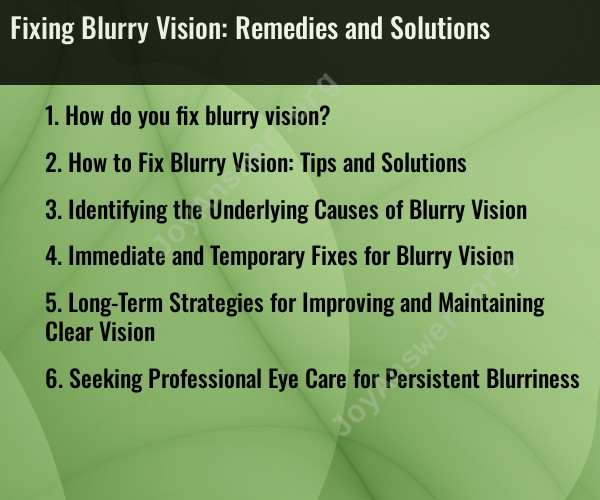How do you fix blurry vision?
Fixing blurry vision depends on the underlying cause of the blurriness. Blurry vision can be a symptom of various eye and health conditions, so it's important to identify the root cause. If you're experiencing persistent or sudden blurry vision, it's essential to consult with an eye care professional, such as an optometrist or ophthalmologist, for a comprehensive eye examination. They can diagnose the issue and recommend appropriate remedies or solutions. Here are some common causes of blurry vision and potential ways to address them:
Refractive Errors: Blurry vision can be caused by common refractive errors such as myopia (nearsightedness), hyperopia (farsightedness), astigmatism, or presbyopia (difficulty focusing on close objects with age). Corrective measures include:
- Prescription eyeglasses or contact lenses.
- Refractive surgery like LASIK or PRK.
Cataracts: Cataracts cause clouding of the eye's natural lens. Treatment options may include:
- Cataract surgery to replace the cloudy lens with an artificial intraocular lens.
Glaucoma: Increased intraocular pressure can lead to optic nerve damage and blurry vision. Management includes:
- Medications to lower intraocular pressure.
- Surgical procedures in some cases.
Dry Eye Syndrome: Dry eyes can cause blurry vision. Treatment may involve:
- Artificial tears or prescription eye drops.
- Managing contributing factors like environmental conditions.
Retinal Disorders: Conditions affecting the retina, such as macular degeneration or diabetic retinopathy, can cause vision problems. Management includes:
- Medical treatments, laser therapy, or surgical interventions, depending on the condition.
Eye Infections: Infections like conjunctivitis (pink eye) can result in blurry vision. Treatment options involve:
- Antibiotics or antiviral medications as prescribed by a healthcare provider.
Eye Fatigue: Extended screen time or excessive reading can lead to eye strain and temporary blurred vision. Solutions include:
- Taking regular breaks from screens.
- Using proper lighting and ergonomic setups.
- Prescription computer glasses or blue light filters.
Underlying Health Conditions: Certain health issues, such as diabetes or hypertension, can affect vision. Managing these conditions can help improve vision.
Remember that self-diagnosis and treatment for blurry vision are not recommended. Consult with an eye care professional to determine the cause and receive appropriate guidance on how to address the specific issue affecting your vision. Early intervention can prevent more serious vision problems and help you find the right treatment or solution for your blurred vision.
How to Fix Blurry Vision: Tips and Solutions
Blurry vision can be caused by a variety of factors, including refractive errors (such as nearsightedness, farsightedness, and astigmatism), dry eyes, and age-related macular degeneration.
Here are some tips and solutions for fixing blurry vision:
- Get regular eye exams. Eye exams can help to detect vision problems early on, when they are most treatable.
- Wear glasses or contact lenses if you have a refractive error. Glasses and contact lenses can correct refractive errors and improve your vision.
- Use artificial tears if you have dry eyes. Artificial tears can help to lubricate your eyes and relieve dryness.
- Take breaks when using electronic devices. Staring at screens for long periods of time can cause eye strain and dry eyes.
- Eat a healthy diet. A healthy diet can help to keep your eyes healthy and reduce your risk of developing vision problems.
Identifying the Underlying Causes of Blurry Vision
There are a variety of underlying causes of blurry vision, including:
- Refractive errors: Refractive errors are the most common cause of blurry vision. They occur when the eye cannot focus light correctly on the retina.
- Dry eyes: Dry eyes occur when the eyes do not produce enough tears or when the tears evaporate too quickly. This can cause a variety of symptoms, including blurry vision.
- Age-related macular degeneration: Age-related macular degeneration (AMD) is a common eye disease that affects the central part of the retina. AMD can cause blurry vision and loss of central vision.
- Cataracts: Cataracts are a clouding of the lens of the eye. Cataracts can cause blurry vision, difficulty seeing at night, and glare.
- Glaucoma: Glaucoma is a group of eye diseases that damage the optic nerve. Glaucoma can cause blurry vision, peripheral vision loss, and blindness.
Immediate and Temporary Fixes for Blurry Vision
If you are experiencing blurry vision, there are a few things you can do to immediately and temporarily improve your vision:
- Blink rapidly. Blinking can help to moisten your eyes and reduce blurry vision caused by dry eyes.
- Splash your eyes with cold water. Cold water can help to constrict the blood vessels in your eyes and reduce redness and inflammation.
- Massage your eyelids. Gently massaging your eyelids can help to stimulate the production of tears.
- Take a break from electronic devices. Staring at screens for long periods of time can cause eye strain and dry eyes.
- Use artificial tears. Artificial tears can help to lubricate your eyes and relieve dryness.
Long-Term Strategies for Improving and Maintaining Clear Vision
In addition to the immediate and temporary fixes listed above, there are a few long-term strategies you can follow to improve and maintain clear vision:
- Eat a healthy diet. A healthy diet can help to keep your eyes healthy and reduce your risk of developing vision problems. Make sure to eat plenty of fruits, vegetables, and whole grains.
- Get regular exercise. Exercise can help to improve blood circulation and reduce stress. Both of these factors can help to improve vision.
- Protect your eyes from the sun. Wear sunglasses when outdoors to protect your eyes from the sun's harmful ultraviolet (UV) rays.
- Quit smoking. Smoking can damage the blood vessels in your eyes and lead to vision problems.
Seeking Professional Eye Care for Persistent Blurriness
If you are experiencing persistent blurry vision, it is important to see an eye doctor for a comprehensive eye exam. The eye doctor can help to identify the underlying cause of your blurry vision and recommend the best course of treatment.
In some cases, blurry vision may be a sign of a serious medical condition. If you experience any of the following symptoms along with blurry vision, it is important to see a doctor right away:
- Sudden blurry vision
- Severe pain in the eye or around the eye
- Changes in your vision, such as seeing double or having halos around lights
- Redness and inflammation in the eye
- Sensitivity to light
By following these tips and solutions, you can improve and maintain clear vision.













